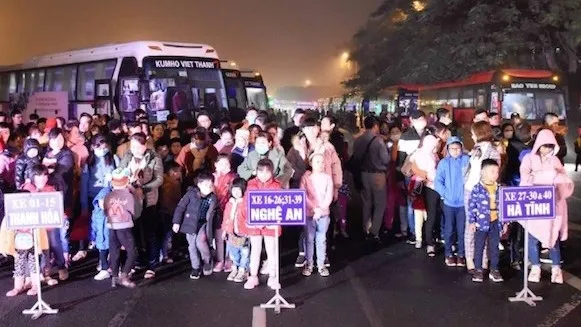Better care for employees to enjoy Tet

In addition, the recent storms and floods in several central provinces have caused severe damage for the local people, including many families of workers and employees living and working in many other provinces and cities around the country. Experts and trade unions predicted that many workers from the central region will not return to their homeland to enjoy Tet (the Lunar New Year) in 2021 because they have to save and send money to help their families. Therefore, it is necessary to proactively develop and implement a plan of caring for workers and employees in accordance with practical conditions right now towards the goal of all trade unions’ members and employees having an enjoyable Tet.
On the occasion of the Lunar New Year in 2020, nearly eight million employees and workers received aid worth a total of almost VND4.1 trillion; meanwhile, over 1,600 workers were handed new houses. Accordingly, following the seven consecutive years since successfully launching the campaign “Tet sum vay” (Tet Gathering), over 30 million employees were presented gifts and donations worth a total of over VND15 trillion.
Also according to the Vietnam General Confederation of Labour, an aid package worth hundreds of billions of Vietnamese dongs will be granted to its members and employees. The 2021 “Tet Gathering” campaign will continue to be implemented and spread, focusing on the grassroot level, industrial and export processing zones and enterprises. In particular, employees and workers who have been affected by the COVID-19 pandemic and natural disasters will receive special attention. Through the campaign, Party committees, authorities, organisations and the whole political system will together join the activities of caring for employees ahead of Tet.
In addition to the thoughtful organisation of free and safe buses for trade union members and workers to return their homes to enjoy Tet, trade unions at all levels should hold more entertainment activities as well as visiting and presenting gifts to employees who are not able to return their hometowns. Trade unions should also proactively coordinate with the relevant agencies to thoroughly grasp outstanding salaries, social and health insurance from enterprises to propose settlement solutions to the local authorities while urging and inspecting the payment of salaries and bonuses for Tet. It is also crucial to promptly detect and take measures to protect the interests of workers in enterprises that were affected by COVID-19 and flooding and at risk of going bankrupt.
Trade unions must continue to inspect and supervise employersin their implementation of the law on working conditions, workand rest time, not allowing employers force workers to increase shifts and work overtime as well as limiting labour disputes and effectively preventing illegal strikes. They should also propose business owners pay visits and present gifts to employees in addition to wages or organise other encouragement and careactivities.
Trade unions at grassroot level need to thoroughly grasp and promptly report the situation of enterprises facing difficulties in production and businesses or business owners running away from the unions to superior agencies. In addition, the propaganda and encouragement of trade union members and employees to celebrate Tet festival economically and safely as well as obeying the provisions of the law and returning to work on time should be enhanced. Employees and workers who have to be on duty and work shifts are required to perform their duties well, ensure labour and traffic safety and avoid social evils.
In order to better care for employees, trade unions at all levels should further uphold the resources of the whole society, the responses and support of the local authorities, organisations and enterprises. The unions must then report aid packages for Tet to the Party committees, authorities and leaders in the localities. The organisation of free buses for workers and trade union members to return to their homes to enjoy Tet should be safe, thoughtfully organised and economical. Accordingly, employees who are living in difficult circumstances must be prioritised.





